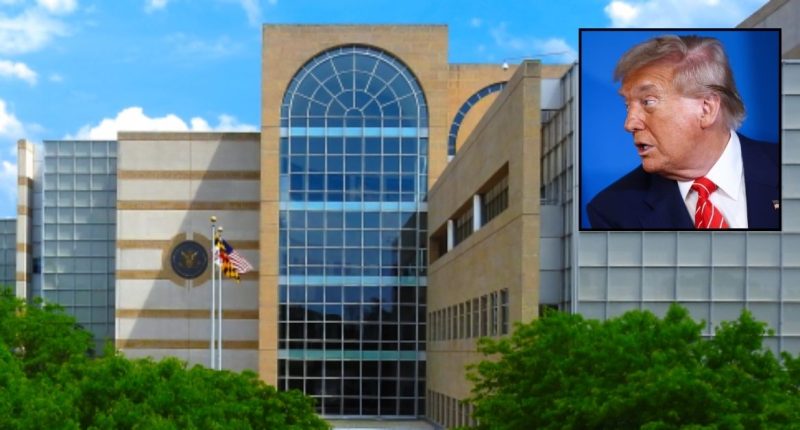Share this @internewscast.com
The accompanying image shows the U.S. District Court building for the District of Maryland’s Southern Division in Greenbelt, Maryland, while an inset features President Donald Trump speaking during a meeting with NATO Secretary General Mark Rutte at a NATO summit in The Hague, Netherlands, on Wednesday, June 25, 2025 (Photo by Piroschka Van De Wouw via AP).
The Department of Justice has filed a lawsuit against the U.S. District Court for the District of Maryland and its judges. The litigation concerns a standing order that prevents the government from deporting individuals within two business days after they file a habeas corpus petition.
The DOJ argued that Chief U.S. District Judge for Maryland, George L. Russell III’s order, issued in May, is “an especially flagrant instance of judicial overreach that intrudes on Executive Branch responsibilities and thereby disrupts the democratic process.”
Love true crime? Sign up for our newsletter, The Law&Crime Docket, to get the latest real-life crime stories delivered right to your inbox.
Because every Old Line State federal district judge is named as a defendant in the complaint, the DOJ asks that each judge recuse themselves from the case — and that it be referred to the U.S. Court of Appeals for the 4th Circuit Clerk’s Office “for assignment of a randomly selected district judge from another District” or that the case be altogether transferred to another district.
Judges have immunity for official acts, so it is possible the hope for recusal is the real design of the lawsuit.
Russell’s May 28 order automatically granted injunctions against the government in response to petitions for writs of habeas corpus filed by immigrants facing deportation or a change of their legal status. He shared how the “influx of habeas petitions” had created scheduling problems and “resulted in hurried and frustrated hearings” — necessitating his order to “preserve existing conditions and the potential jurisdiction of this Court over pending matters while the Court determines the scope of its authority to grant the requested relief.”
The administration made its opinion clear — that the court exceeded its authority and that the standing order is an “unlawful use of equitable powers to restrain the Executive.” To the federal government, the order presents its own scheduling difficulties — namely concerning the logistics of deporting people they deem illegal immigrants.
“The Orders can also adversely impact the operational planning necessary to coordinate a removal, especially a removal of an alien to a country that is recalcitrant about accepting the alien,” the DOJ wrote as one example. “Removals can take months of sensitive diplomacy to arrange and often do not completely come together until the last minute. A delay can undo all of those arrangements and require months of additional work before removal can be attempted again.”
Furthermore, to the federal government, the scheduling problems for the court may be burdensome, but “Inconvenience to the Court is not a basis to enter an injunction, and filings outside normal business hours, scheduling difficulties, and the possibility of hurried and frustrating hearings are not irreparable harms.”
The DOJ’s larger argument is consistent with President Donald Trump’s and his top lieutenants’ point since he entered office this January — that judges blocking administration efforts represent a thwarting of citizens’ desires.
As they wrote on Tuesday:
Every unlawful order entered by the district courts robs the Executive Branch of its most scarce resource: time to put its policies into effect. In the process, such orders diminish the votes of the citizens who elected the head of the Executive Branch.
Included as defendants in the DOJ’s lawsuit are district judges Paula Xinis, who has ruled on the case of Kilmar Abrego Garcia; Theodore Chuang, who expressed unease with the transparency provided by the Department of Government Efficiency; and Stephanie Gallagher, who demanded the administration return a “wrongfully” deported man named Daniel Lozano-Camargo.
The U.S. District Court for the District of Maryland had no comment regarding the new lawsuit when contacted by Law&Crime.















